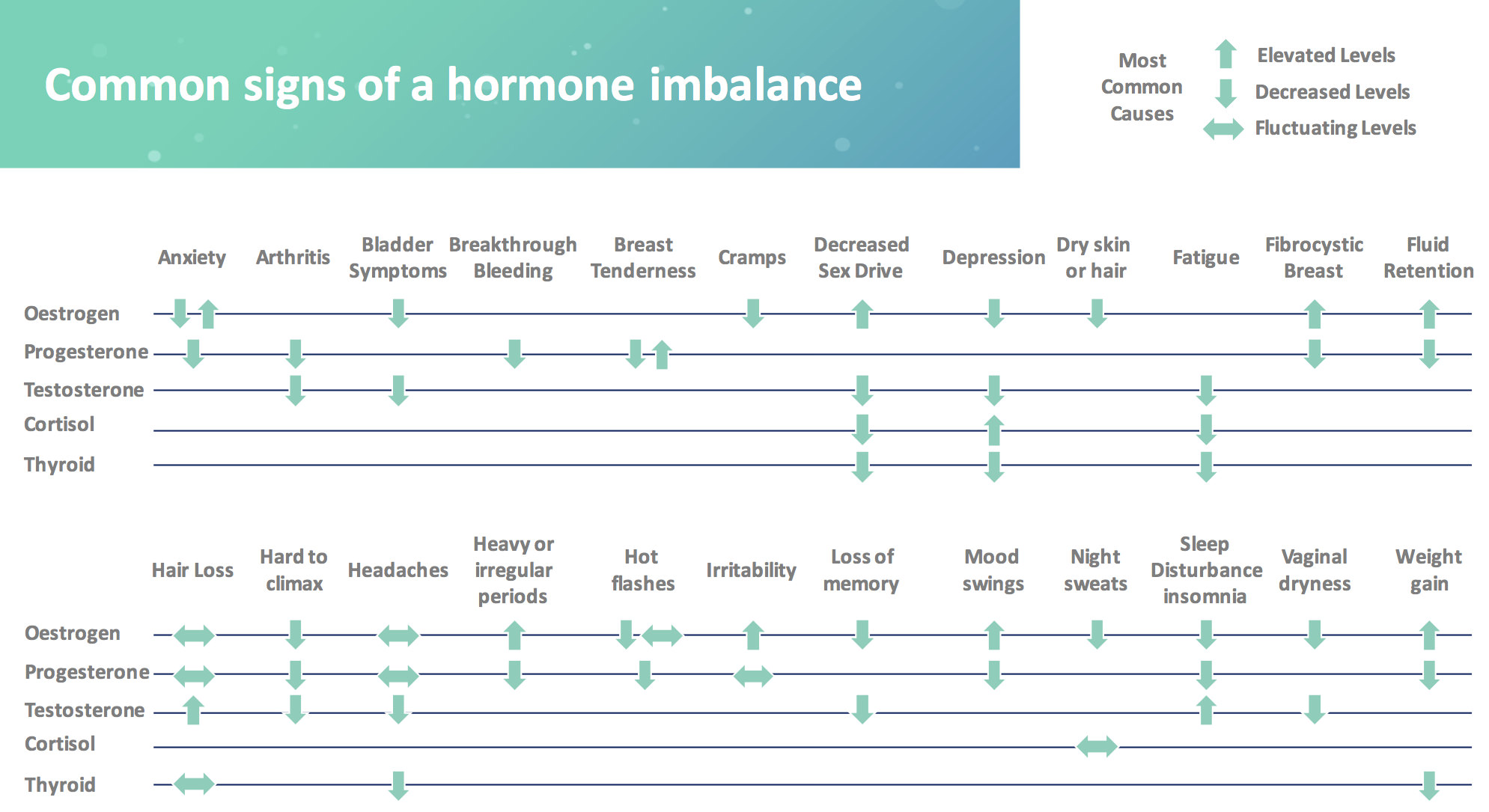What are hormones?
Hormones are chemical messengers in the body that are created in the endocrine glands. These messengers control most major bodily functions from basic needs like hunger to complex systems like reproduction and emotions.
The body produces many different hormones, but certain types have a bigger role to play in the body's health and well-being. Understanding these roles is important if you’re seeking to proactively manage your health.
A hormone imbalance can cause chronic health issues
When your hormones are in proper balance they help the body thrive, but small problems with hormones can cause serious and life-altering symptoms. Specifically, imbalances of sex hormones, thyroid hormones and adrenal hormones are common problems that can contribute to a host of chronic health issues. Unfortunately, conventional medicine often doesn’t understand the significant role hormone imbalances play in many health complaints.
How do I know if I have a hormone imbalance?
The following list of common complaints can often be helped or eliminated by improving hormone health. The challenge is often finding out the starting place of your hormone imbalance to ensure you are treating the root of the problem rather than just the symptoms. And that’s where hormone testing comes in.
- Fatigue
- Sleeping problems
- Weight loss difficulties
- Depression and anxiety
- Mood swings and emotional problems
- Dry skin and rashes
- Hair loss
- Allergies
- Body and joint pain
- Chronic headaches
- Infertility
- Menstrual irregularities
- Poor immune function
- Paranoia
When assessing a hormone imbalance, it’s important to evaluate the endocrine system as a whole. This is because the endocrine system is complex and hormones and their actions are intricately linked – this means that hormone imbalances originating from different areas can cause the same symptom.
How do I know which hormones are out of balance?
If you have a sneaking suspicion you have a hormone balance, the chart below may help you understand where the issue is originating from.

How can I find out if I have a hormone imbalance?
The most reliable way to confirm a hormone imbalance is through testing. Blood, saliva, and DUTCH (Dried Urine Test for Comprehensive Hormones) are all valid tools, each offering unique insights depending on your symptoms. At i-screen, blood testing is used to accurately assess sex hormones, thyroid function, insulin, and other metabolic markers. However, for symptoms related to stress, sleep disruption, or energy crashes—where cortisol or adrenal patterns are suspected—saliva or DUTCH testing is preferred. This is because cortisol follows a diurnal rhythm and needs to be measured across the day, which blood testing cannot conveniently capture.
Which test should I choose?
i-screen offers a range of hormone tests to suit different needs, depending on your symptoms, age, and health goals:
- If you're mainly concerned about sex hormone imbalance — for example, symptoms like irregular cycles, PMS, or low libido — theFemale Hormone Check is a good place to start.
- If you're experiencing a wider range of symptoms like fatigue, weight gain, anxiety, poor stress tolerance, or skin and hair changes, the more comprehensive Hormone Imbalance Check (female) is recommended. It includes sex hormones as well as thyroid function, cortisol, DHEA-S, insulin, and IGF-1 — ideal for identifying imbalances that a sex hormone test alone might miss.
- If you suspect your thyroid is contributing to your symptoms (e.g. sluggishness, cold intolerance, brain fog, or changes in weight or hair), the Thyroid Check or Advanced Thyroid Check can offer insight into both hormone levels and autoimmune causes.
- For issues related to stress, poor sleep, or burnout, the Adrenal Fatigue Check is a non-invasive saliva test that evaluates cortisol levels throughout the day.
If symptoms persist despite normal blood results, further investigation with saliva or DUTCH testing may provide answers by assessing active hormone levels and metabolic pathways that are not captured in standard blood tests.
If you need further guidance on which test is right for you, then contact us and one of our medical professionals will be in touch to work through your symptoms.
Further information
Check out some of our other blogs for further information about thyroid health, adrenal function and perimenopause:


